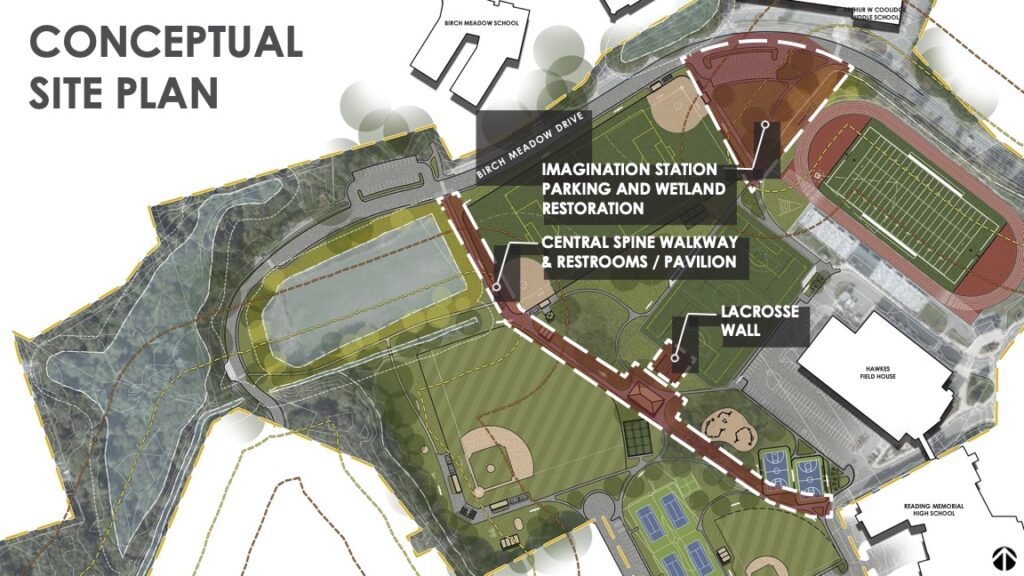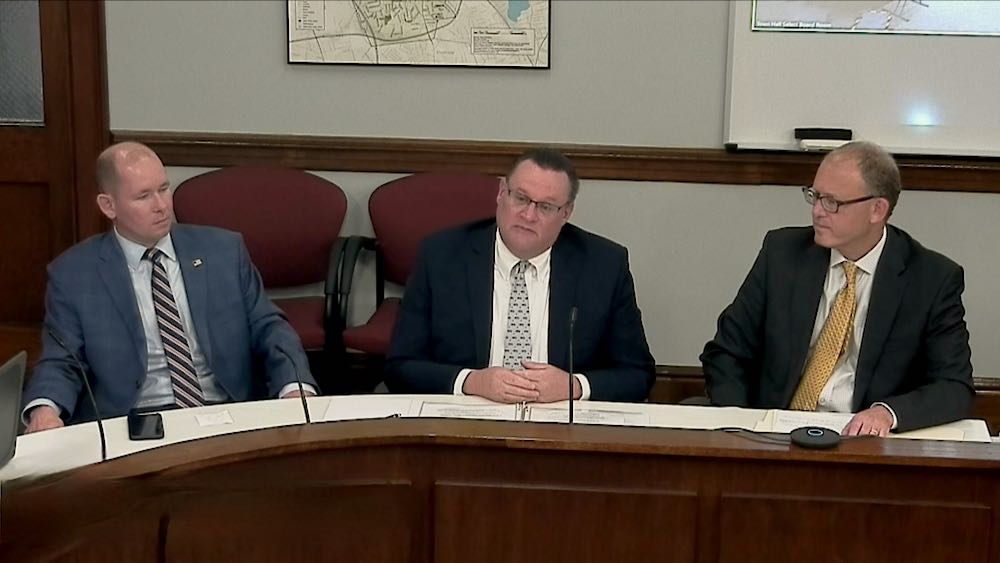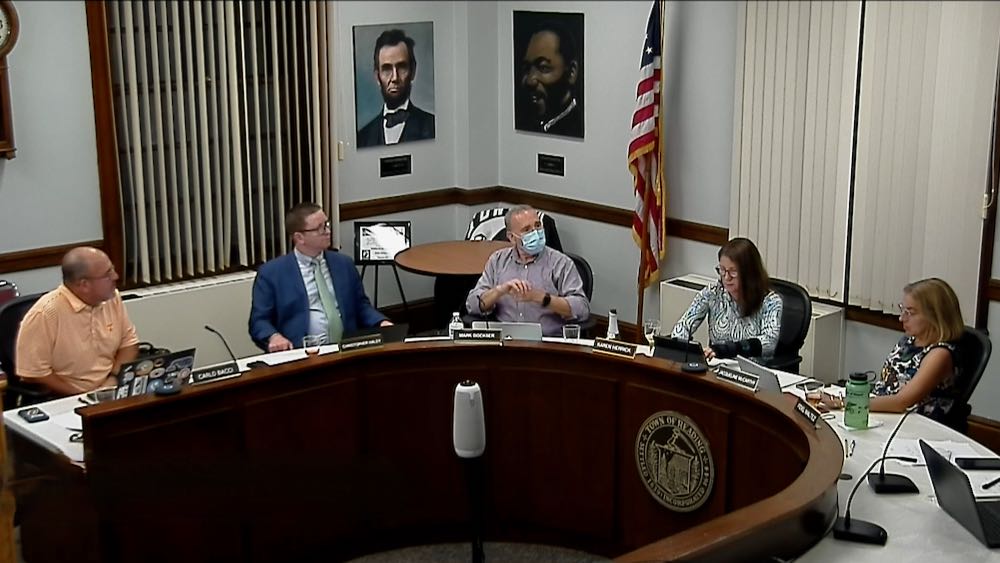
ARPA Spending
Reading, MA — On the recommendation of the Reading ARPA Advisory Committee (RAAC) and by a vote of 5-0, the Select Board approved the appropriation of $1.5 million in American Rescue Plan Act (ARPA) funds for the development of the first phase of the Birch Meadow Master Plan on Tuesday. The funding will be used to improve parking in the former “imagination station” area, and it will perform wetlands improvements. Additionally, a connecting “spine” pathway will be built to span the park, and a pavilion with bathrooms and a picnic area will be constructed in the center of the complex. The board’s decision was met with applause from the gathered audience, many of whom represented Recreation department staff and the Recreation Committee.
birch-meadow-park-phase-1Noting how long it has taken to get the Birch Meadow project to this point, Select Board member Christopher Haley declared, “To see this [project] done is going to be a massive win for the town.”
The vote was one of five taken by the board to fund projects around town using ARPA funds. Other projects funded were $13,500 for the Historical Commission to do archival and preservation work, $22,500 for the Conservation Commission to do restoration at Bare Meadow and other projects, and $46,200 for the Reading Food Pantry to be used to fund a year’s worth of gift cards, two new industrial refrigerators, space needs study and $96,100 to assist the Burbank YMCA in reestablishing adaptive programs, including swimming. All the votes were by a 5-0 margin, except for the YMCA funding. Select Board member Jackie McCarthy recused herself from that vote due to a possible conflict of interest.
RAAC chair Maryanne Downing indicated that the RAAC is planning one additional meeting before it sunsets in October to recommend appropriating the remaining $1.9 million in ARPA funds. Still to be determined is the provision of premium pay for the town’s essential workers for in-person work during the pandemic and possible water and sewer cost mitigation. In her statement, McCarthy encouraged the RAAC to continue exploring the premium pay issue.
State Legislation Visit

Reading’s legislative delegation visited the Select Board to review its activities on the town’s behalf on Beacon Hill. Senator Jason Lewis described some of the legislation accomplished in the past session, including what he described as “a really good budget for municipalities.” Lewis also touted an $11 billion transportation bill and the climate bill. He noted that Reading has benefitted from the $2.1 million MVP grant for the Maillet, Sommes, Morgan Conservation area and from $600,000 in chapter 90 money to be used for road improvements.
Lewis also highlighted that mail-in and early in-person voting have been codified into law in the Commonwealth to make it easier for people to vote.
Representative Brad Jones added that while the economic development bill “did not get across the finish line,” the House and Senate versions were close, and the bill could be completed soon. The bill includes a potential $2.9 billion returned to taxpayers. Jones praised Town Manager Fidel Maltez for “not being shy” regarding communication with the delegation and noted that the delegation and Maltez had arranged quarterly update meetings. Jones also pledged to attempt to get any home rule petitions that the November Town Meeting approves through the Legislature by the end of the year.
Representative Richard Haggerty reminded the board that the state still has $2 billion in ARPA money to spend and that details on what the state is going to do with it could be coming in the next year. He also noted that Reading received $3.7 million in unrestricted state aid in the past year, $11 million in chapter 70 money, and earmarks for the high school robotics team and repairs at Memorial Park. Lewis also shared that future potential earmarks include $1 million for a new senior center, $100,000 for a downtown rapid recovery plan, $25,000 for a second community garden, $25,000 for the food pantry, and $25,000 for the Chamber of Commerce. “Thank you for your collaboration and for delivering the goods,” chair Mark Dockser commented.

Select Board member Carlo Bacci questioned the delegation regarding the possibility of a payroll tax holiday for small businesses. Dockser asked about the status of the legislation allowing Reading to join Green Communities. Jones indicated that the legislation is very close to completion. McCarthy looked for continued clarification regarding the MBTA Communities regulations, to which Jones responded that the process is a dynamic one and that regulations are open to change. Several board members also engaged in conversation with Lewis regarding the formula for Massachusetts School Building Authority reimbursement.
The exchange closed with Lewis making a push for ballot question one to be passed by the voters in November as it would create additional funding for projects. Jones countered that the question, as worded, which would increase the income tax on annual incomes over $1 million, is not specific enough as to the potential use of the additional funds.
Town Meeting Warrant Preview
The town manager gave an overview of the twenty-three warrant articles for November town meeting. These include $2.2 million for a feasibility study and schematic design for the Killam Elementary School project, permission to enter into long-term contracts with cell service providers for space on the Auburn Street water tower, $750,000 for design work to be done for Haven Street improvements, and a possible bylaw banning the use of polystyrene in town.
Both Bacci and Haley stated concerns regarding the ban on polystyrene, with Haley questioning why it does not apply to the sales of products from large supermarkets. Bacci was concerned over costs and supply chain issues for small businesses. While acknowledging the concerns, Select Board member Karen Herrick indicated that an education campaign regarding the banned products would accompany the bylaw if passed.
The Reading Post will have extended coverage of all the warrant articles for November town meeting as town meeting approaches. The warrant will be closed at the next Select Board meeting on September 20.
After a public hearing, the Select Board voted 5-0 to approve changes to the town’s personnel manual. It reviewed an idea presented by Dockser for a capital planning committee, discussed the issue of how to improve cell phone coverage in town, and asked for staff input into developing a town master plan.
The Select Board adjourned at 11:00pm.
